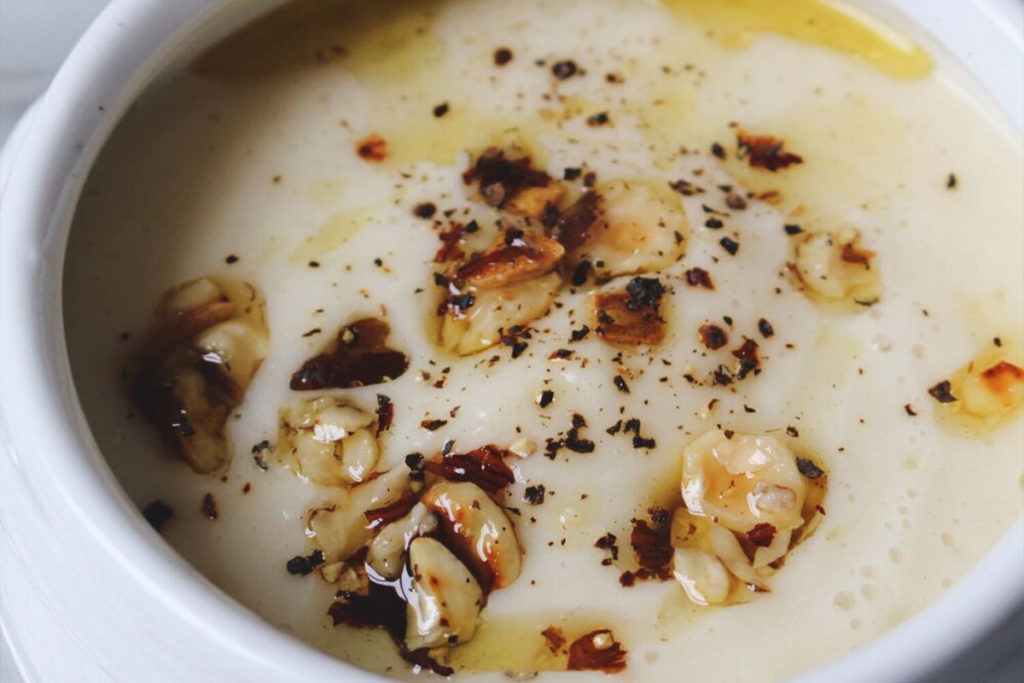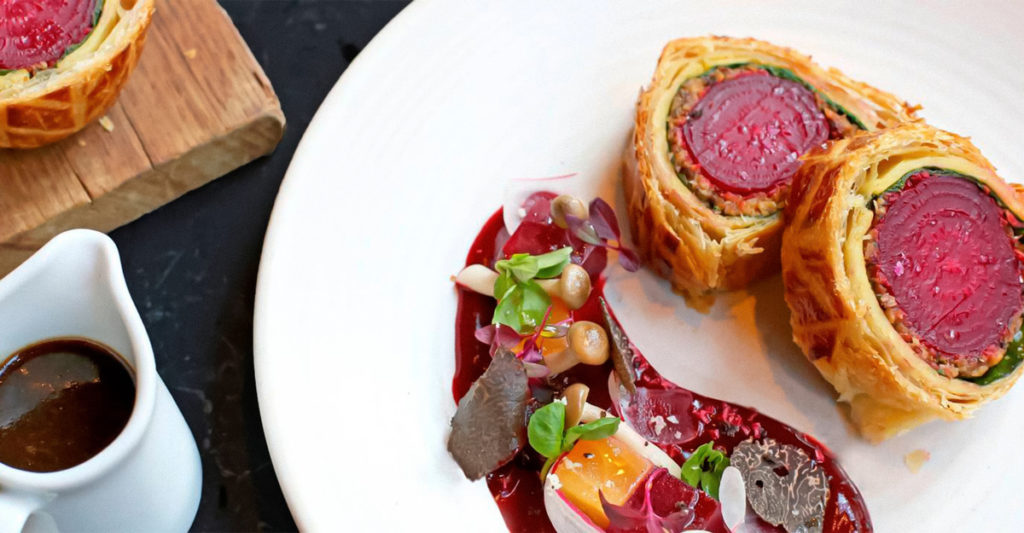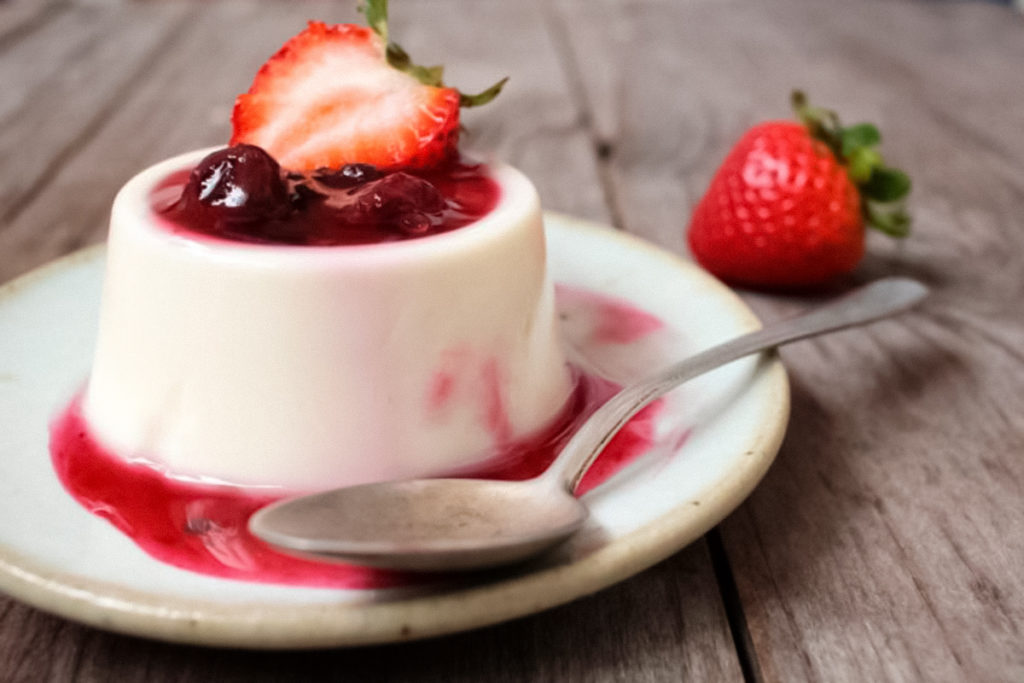Celebrate a conscious Christmas with this vegan dinner



This silky textured soup with a delicious contrast of flavors is a delicate and elegant starter to start a vegan Christmas dinner. To prepare it, you need 1 kilo of chopped turnip, 1 chopped potato, 1 chopped onion, a handful of mild herbs such as thyme and bay leaf, 2 cloves of garlic, a drizzle of truffle oil, 1 liter of vegetable stock and a handful of toasted, peeled and chopped hazelnuts.
Put a good splash of olive oil in a skillet, sauté the herbs to release their aroma, onion, and garlic, add the turnip and potato until browned a little, and then add all the broth. Bring to a boil for 30 minutes. When the vegetables are soft, remove the herbs and grind everything with a food processor. Strain through a sieve to discard any fibers and get a silky texture. Adjust salt and pepper.
Serve it piping hot with chopped hazelnut pieces and a final drizzle of truffle oil. To elevate the experience, pair this luxurious soup with a glass of vegan wine such as Gran Reserva Sauvignon Blanc.

Beetroot has a special place among the vegetables that work best as a substitute for meat. This creative recipe from British chef Gordon Ramsay, called Beet Wellington after the iconic English dish Beef Wellington, consists of beetroot wrapped in a rich baked pastry.
To prepare it, you need 500 grams of beetroot, as round as possible, boiled in water (with aniseed, mustard seeds, 200 grams of sugar, sherry vinegar, and red wine vinegar). Also, add 200 grams of sautéed spinach, 500 grams of chopped mushrooms sautéed with garlic and thyme, 150 grams of cooked and chopped chestnuts, truffle oil, and sheets of vegan puff pastry dough.
Peel the beetroots once cooked. On the other hand, prepare the mushroom Duxelle by mixing them in a pan with the chestnuts, herbs such as thyme, and truffle oil. Once ready, place a piece of cling film on the counter. Cover the raw dough sheet with a layer of mushroom Duxelle, then a layer of sautéed spinach, and finally, the peeled beetroot. Wrap everything carefully in a roll and leave it in the refrigerator for an hour. Then remove the film and let it rest for another hour.
Before putting it in the oven, brush it with chickpea water and cook at 210 degrees for 18 minutes. Serve with your favorite side dishes: roasted potatoes, salads, roasted Brussels sprouts, and mashed cauliflower. Don’t forget to pair it with a Gran Reserva Carmenère, a perfect complement to this spicy dish.

Thanks to the increased consumption of plant-based milk, it is now possible to find various vegan ingredients for baking. Such is the case of soy or oat creams, used in this recipe as a base for a delicious pannacotta. You need 400 ml of vegan cream, 150 ml of oat or soy milk, 4 tablespoons of agave syrup, vanilla essence, and two teaspoons of agar-agar powder.
Put all the ingredients in a saucepan and heat them without boiling until the agar-agar is well dissolved. Pour the portions into cups or bowls and put them in the refrigerator for two hours. Once they are firm, cover them with a layer of red berries (cooking two cups of red berries with a bit of sugar and a touch of vanilla until it takes a jam consistency). You can accompany this rich dessert with a glass of sweet white wine, Merlot, or try our Gran Reserva Cabernet Sauvignon.
We comply with the highest standards of verified social and environmental performance, transparency, and legal responsibility to balance benefit and purpose.
We adopt an Impact Business Model, creating beneficial links between business, community, and environment.
The Gran Reserva vineyards are an important part of the project to conserve native forest areas and protect local biodiversity. Our native forests have the ability to retain rainwater and control the kind of climate change that results from water shortages.
We take care of 1,432 hectares of protected forests and, on average per vineyard, a total of 105 species of fauna and 48 species of registered flora.
Our effort to preserve nature begins with responsible water consumption. 99% of the water we use comes from surface and subterranean sources.
Our vineyards are drip irrigated, which translates to a 90% efficiency on water consumption, and over the past 3 years, we’ve reduced our water footprint by 10%.
All of our winemaking processes require the use of energy. Our choice to invest in clean, renewable energy reflects our desire to co-create a sustainable planet for the future.
100% of the electricity used to make the wines in the Gran Reserva collection come from renewable sources, including solar energy.
Concha y Toro has been certified under the Wines of Chile Sustainability Code since 2012, which means that our vineyards are officially recognized as sustainable vineyards.
The wines in our Gran Reserva collection are crafted entirely from estate-owned grapes in sustainably managed vineyards.